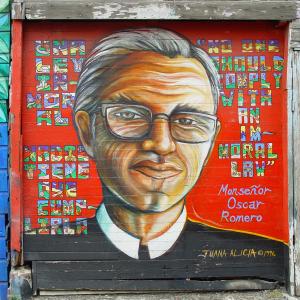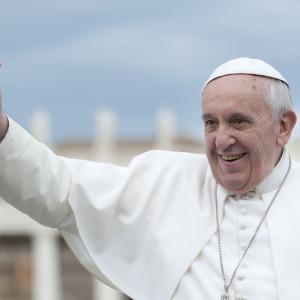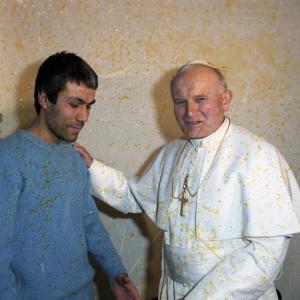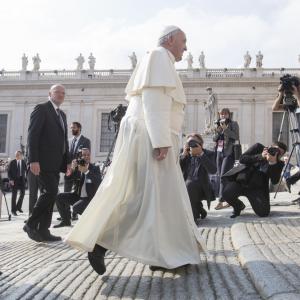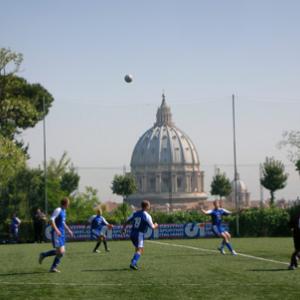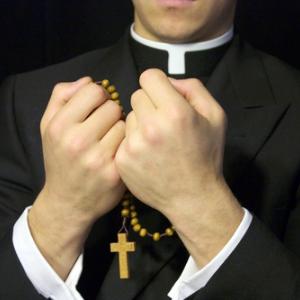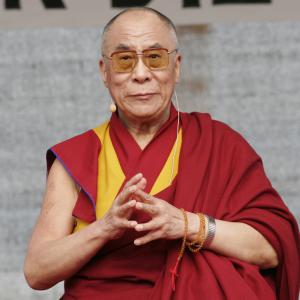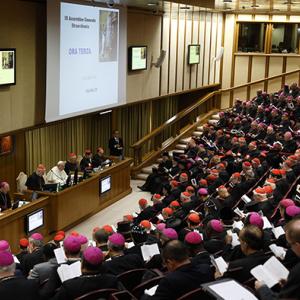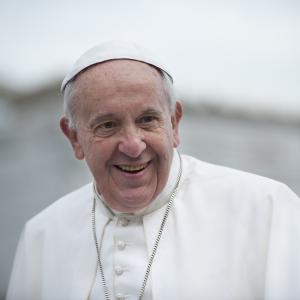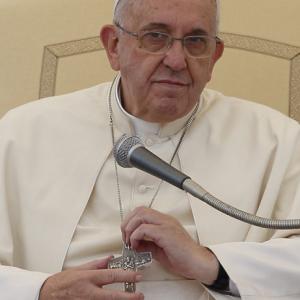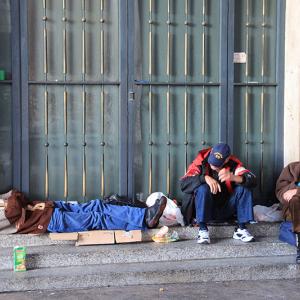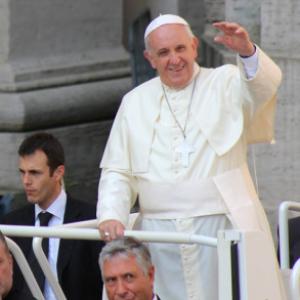Josephine McKenna writes for Religion News Service.
Posts By This Author
Pope Francis to Moms: It’s OK to Breast-Feed in Public
While baptizing 33 babies in the Sistine Chapel on Jan. 11, Pope urged mothers to breast-feed their infants if they were hungry.
“Mothers, give your children milk — even now,” Francis said. “If they cry because they are hungry, breast-feed them, don’t worry.”
The pope departed from his prepared text, which included the phrase “give them milk,” and inserted the Italian term “allattateli,” which means “breast-feed them.”
The celebration took place to mark the day Jesus was baptized by John the Baptist in the waters of the Jordan River.
Francis also asked the parents gathered to remember the poor mothers around the world.
“Let us thank the Lord for the gift of milk, and we pray for those mothers — there are so many, unfortunately — who are not able to give their children food to eat,” he said.
Oscar Romero Declared a Martyr as Vatican Inches Him Toward Sainthood
Archbishop Oscar Romero, the hero of the Catholic left who was assassinated in 1980 while celebrating Mass in El Salvador, is inching one step closer to sainthood after his case languished in bureaucratic limbo for decades.
According to the Italian Catholic bishops daily, Avvenire, a panel of theologians at the Congregation for the Causes of Saints has ruled unanimously that Romero should be considered a martyr, or murdered “in odium fidei” (Latin for “hatred of faith”).
The paper reported the ruling was made on Jan. 7. The move is considered a decisive step on Romero’s path to sainthood.
Romero, the archbishop of San Salvador, was shot dead by right-wing death squads while celebrating Mass in March 1980. His murder came a day after he delivered a homily calling for soldiers to lay down their guns and end government repression in the country’s bloody civil war.
Want to See Pope Francis’ Vision for the Church? Look at His New Cardinals
Pope Francis reinforced his radical reshaping of the Catholic Church by naming 20 new cardinals from countries as far afield as Ethiopia, Tonga, Thailand, and Panama.
The clerics – who come from 18 different countries – include 15 who are eligible to vote for the pope’s successor in a future conclave, and five retired bishops and archbishops “distinguished for their pastoral charity” who are over age 80 and ineligible to select the next pontiff.
Dissatisfied with the slow pace of change in Rome, Francis’ appointments reflect his desire for “pastors on the front line of difficult situations,” one Vatican observer said, who can bring a new perspective from the often overlooked outposts of global Christianity.
The Vatican’s chief spokesman, the Rev. Federico Lombardi, said the choices showed the pope’s most important criteria was “universality,” and indicated he was not “chained to tradition” as he moves the balance of power at the highest levels of the church closer to the developing world.
It is the first time ever that cardinals have been selected from Tonga, Myanmar, and Cape Verde to become “princes of the church.” There are only five Europeans included among the 15 new electors – two from Italy and three others from Corsica, Spain, and Portugal. The United States was shut out for the second time in a row.
Would-Be Papal Assassin Mehmet Ali Agca Expelled From Italy
Mehmet Ali Agca, the Turkish man who tried to assassinate St. John Paul II in 1981, was expelled from Italy on December 29 after paying a visit to the tomb of the Polish pontiff.
An Italian judge on Monday approved the expulsion of the former terrorist — he was scheduled to be sent back to Istanbul on a Turkish Airlines flight from Rome Monday night, police sources told the Italian news agency, ANSA.
Agca’s expulsion came two days after he placed flowers on the late pope’s tomb in St. Peter’s Basilica on Saturday.
Agca, 56, served 19 years for his crime in Italy, where John Paul famously visited him in prison. He was then deported to his native Turkey, where he served further time for the murder of left-wing journalist Abdi Ipekci, who was killed in 1979.
Pope Blasts Vatican Administration, Accuses Some of Spiritual ‘Alzheimer’s’
VATICAN CITY — Pope Francis launched a blistering attack on the Vatican bureaucracy on Monday, outlining a “catalog of illnesses” that plague the church’s central administration, including “spiritual Alzheimer’s” and gossipy cliques.
The pope’s traditional Christmas greeting to the cardinals, bishops and priests who run the Holy See was more “Bah! Humbug!” than holiday cheer as he ticked off a laundry list of “ailments of the Curia” that he wants to cure.
In a critique that left many of the assembled clerics clearly uncomfortable, the 15 ailments in Francis’ “catalog of illnesses” reflected the take-no-prisoners approach he promised when he was elected nearly two years ago as an outsider with little direct experience in Rome.
“The Curia is called upon to improve itself, always improve itself and grow in communion, holiness and knowledge to fully realize its mission,” the pope said.
“Yet like every body, like every human body, it is exposed to illnesses, malfunctioning, infirmity. They are illnesses and temptations that weaken our service to God.”
In a separate address to Vatican staff later, Francis begged pardon for the “shortcomings” of senior church leaders, as well as the “several scandals” that had “caused so much harm,” without specifying which scandals he had in mind.
If Rome Wins 2024 Summer Olympics, Vatican Could Host Competitions
Major sporting events could be held at the Vatican if Rome wins its bid to host the Summer Olympics in 2024.
Pope Francis, a keen soccer fan, is reported to be enthusiastic about the idea. He is expected to meet the head of Italy’s National Olympic Committee, Giovanni Malago, and other officials at the Vatican on Dec. 19 after a Mass to commemorate the committee’s 100th anniversary
Cardinal Jose Saraiva Martins, former head of the Congregation for the Causes of Saints, said he believed Francis would back plans to hold events such as archery in the Vatican gardens.
He told the Florence daily La Nazione that events could also be staged at the pope’s summer palace at Castel Gandolfo outside Rome.
“It seems like a good idea, I think the pope will approve,” Saraiva Martins said.
Australians Suggest Celibacy Played a Role in Clergy Abuse Scandal
The Roman Catholic Church in Australia acknowledged that “obligatory celibacy” may have contributed to decades of clerical sexual abuse of children in what may be the first such admission by church officials around the world.
A church advisory group called the Truth, Justice and Healing Council made the startling admission Dec. 12 in a report to the government’s Royal Commission, which is examining thousands of cases of abuse in Australia.
The 44-page report by the council attacked church culture and the impact of what it called “obedience and closed environments” in some religious orders and institutions.
“Church institutions and their leaders, over many decades, seemed to turn a blind eye, either instinctively or deliberately, to the abuse happening within their diocese or religious order, protecting the institution rather than caring for the child,” the report said.
Dalai Lama Says Pope Francis' Unwillingness to Meet 'Could Cause Problems'
The Dalai Lama said Dec. 11 that he would not meet Pope Francis while in Rome for a summit of Nobel Peace Prize winners.
“The Vatican administration says it is not possible because it could cause problems,” the Dalai Lama said, hinting that the Vatican may be unwilling to irk China, a country with which it wants to engage and perhaps re-establish diplomatic relations.
But the Vatican’s chief spokesman, the Rev. Federico Lombardi, declined to say whether the pope had personally turned down a request for a meeting with the spiritual leader of the Tibetan Buddhists.
“Pope Francis obviously holds the Dalai Lama in very high regard, but he will not be meeting any of the Nobel laureates,” Lombardi told journalists.
Synod on the Family: Dialogue or Clash Between Factions?
Pope Francis used his weekly audience Dec. 10 to challenge media reports of “clashes between factions” at the recent bishops’ synod on family issues.
“Some of you have asked me if the synod fathers fought,” Francis said. “I don’t know if they ‘fought,’ but they spoke forcefully. This is freedom. This is just the kind of freedom that there is in the church.”
In a bid to set the record straight, the pope acknowledged the extensive media coverage of the global gathering in October and likened it to “sports or political coverage.”
“They often spoke of two teams, pro and con, conservatives and liberals,” the pope told thousands of pilgrims in St. Peter’s Square.
“There was no clash between factions … but a dialogue between the bishops, which came after a long process of preparation and now continues, for the good of the family, the church, and society. It’s a process.”
5 Takeaways from Pope Francis' Latest Interview
Gay marriage was never on the agenda at the recent Bishops’ Synod on the Family and the subject “did not cross our minds,” Pope Francis said in a new headline-grabbing interview.
Keeping to a format that has become a favorite for this pope, Francis used a high-profile interview to shed light on his thinking, and Vatican policies, on a number of hot-button social issues.
In an interview published Dec. 7, Francis told the Argentine daily, La Nacion, that the Catholic Church must help parents support their gay children. At the same time, he maintained that allowing, condoning or even adapting to same-sex marriage was still not on the church’s agenda.
This was one of several controversial issues he broached in the interview with papal biographer Elisabetta Pique:
Pope Francis Joins Other Faith Leaders to Demand an End to Human Trafficking
Pope Francis and religious leaders from Jewish, Muslim, Hindu and other faiths came together at the Vatican on Dec. 2 to call for an end to slavery by 2020.
At a ceremony in which they signed a declaration to that effect, the pope joined the head of the Anglican Communion, Archbishop of Canterbury Justin Welby, and representatives of Ecumenical Patriarch Bartholomew I and the grand imam of Egypt’s Al-Azhar Mosque, Ahmed Muhammad Ahmed el-Tayeb.
The leaders said it was a “human and moral imperative” to wipe out human trafficking, forced labor, prostitution, and organ trafficking. It also committed the signatories to do all they could to free the estimated 35 million people enslaved across the world.
“Modern slavery … fails to respect the fundamental conviction that all people are equal and have the same freedom and dignity,“ the joint statement said.
“We pledge ourselves here today to do all in our power, within our faith communities and beyond, to work together for the freedom of all those who are enslaved and trafficked so that their future may be restored.”
Pope Francis Makes Overtures to Orthodox and Muslims
Never mind that Turkey is overwhelmingly Muslim. The most enduring image of Pope Francis’ three-day visit to Turkey was the moment when he bowed his head and asked for the blessing of the leader of Eastern Orthodoxy, Ecumenical Patriarch Bartholomew I.
Since his election last year, Francis and Bartholomew have forged a strong alliance culminating in their joint pledge in Istanbul on Nov. 30 to work to bridge a 1,000-year divide between their churches.
The task takes on new urgency as Christians — Catholic, Protestant and Orthodox — face a wave of violent persecution in Syria and Iraq.
The 77-year-old Argentinian pope represents 1.2 billion Roman Catholics and the Turkish-born Bartholomew leads about 250 million Eastern Orthodox Christians.
Pope Francis Urges Europeans to Reject ‘Throwaway Culture’
The 77-year-old pontiff is well-known for his attacks on consumerism and for his compassion for the poor. More recently, Francis has turned his attention to bioethics issues, describing abortion, embryonic stem cell research, and euthanasia as “playing with life” and “a sin against God.”
But this was the first time he has delivered his message on the floor of the parliament of the European Union, which represents 500 million people across 28 countries.
As the first non-European pope to hold the office in almost 1,300 years, Francis also appeared less willing to continue the Roman Catholic Church’s traditionally unconditional support for the EU.
As the impact of the stifling economic crisis is being felt in European countries like France and Italy, Francis attacked the EU for a dearth of leadership, saying its ideals had become weighed down by bureaucracy.
“The great ideals that inspired Europe seem to have lost their power of attraction, in favor of the bureaucratic, technical emphasis of its institutions,” the pope said.
Pope Francis Laments 'Market Priorities' in Struggle Against Hunger
Market speculation and pursuit of profits are hindering the global fight against hunger and poverty, Pope Francis said Nov. 20.
In an address at a U.N. conference in Rome on nutrition, the pope urged the world’s wealthiest nations to do more to help those in need.
“Perhaps we have paid too little heed to those who are hungry,” the pope told delegates from more than 170 countries attending the global gathering at the U.N.’s Food and Agriculture Organization.
“It is also painful to see that the struggle against hunger and malnutrition is hindered by ‘market priorities,’” the pope said.
“The hungry remain, at the street corner, and ask to be recognized as citizens, to receive a healthy diet. We ask for dignity, not for charity.”
The Argentine pope has often called for greater compassion and justice for the world’s poor since his election last year, and he has made charity a priority of his pontificate.
Pope Francis' Visit to Philadelphia Won't Focus on Hot-Button Sex Issues
Philadelphia Archbishop Charles Chaput says hot-button socio-sexual issues won’t be the central focus when the World Meeting of Families welcomes Pope Francis to the City of Brotherly Love next year.
Chaput told a Vatican conference on marriage and the family Nov. 19 that next year’s event comes “at a critical moment in global culture” and willaddress a broader scope of concerns.
“It will deal with a wide range of family issues where our religious faith is both needed and tested,” Chaput said.
“These are matters that affect all families, not only in the United States but on a world scale. So we want to focus next year not just on the neuralgic sexual issues that seem to dominate the American media.”
Reflecting the change in emphasis under Pope Francis that was evident at the recent Vatican Synod on the Family, the four-day event in Philadelphia will look at poverty and the family, marital intimacy, raising children, and the impact of divorce, as well as issues affecting the elderly and the disabled.
Sexual Revolution Is Destroying Families, Russell Moore Tells Vatican Conference
Prominent U.S. evangelicals Russell Moore and Rick Warren blasted the sexual revolution at a Vatican conference Nov. 18 and said it is destroying the institution of marriage.
Moore, the public face of the Southern Baptist Convention, said sexual liberation had created “a culture obsessed with sex” that had simply led to a “boredom of sex shorn of mystery.”
“Western culture now celebrates casual sexuality, cohabitation, no-fault divorce, family redefinition and abortion right as part of a sexual revolution that can tear down old patriarchal systems,” Moore told a global gathering of leaders from Catholic, Jewish, Muslim, and other faiths as part of the “Complementarity of Man and Woman” conference convened by Pope Francis.
The Southern Baptist ethicist said the sexual revolution appeared to have imposed a new patriarchy that enabled men to “pursue a Darwinian fantasy of the predatory alpha male” for the pursuit of “power, prestige, and personal pleasure.”
“Does anyone really believe these things will empower women and children?” he asked. “We see the wreckage of sexuality as self-expression all around us, and we will see more yet.”
Pope Francis to Build Showers for Homeless in St. Peter’s Square
In his latest bid to ease the suffering of the poor — and upend the expectations of the papacy — Pope Francis plans to build showers for the homeless under the sweeping white colonnade of St. Peter’s Square.
Three showers are to be built into refurbished public restrooms provided for Catholic pilgrims along the marble columns leading into the historic basilica, which was completed in 1626.
The Vatican’s deputy spokesman, the Rev. Ciro Benedettini, said Nov. 13 that the project was a joint initiative of the pope and Archbishop Konrad Krajewski, the papal almoner who distributes charity on the pope’s behalf. Construction is due to begin Nov. 17.
It’s an unconventional move, even for a pope who constantly preaches that more should be done to help the poor. It also could rankle traditionalists as the homeless line up to wash beneath the extravagant apostolic apartments that Francis shunned after his election.
“I think it’s a good thing,” said Adrian Sztrajt, a 27-year-old homeless man from the Polish city of Chelm. “I would like to go for showers there.”
Sztrajt and his companion Grzegorz Bialas, also from Poland, sleep with half a dozen others under the porticoes in front of the Vatican press office beside St. Peter’s Square.
Bialas said he’s a fan of the pope but thinks the showers are “a bad idea” since they could attract hundreds of homeless to the Vatican. He also said it was possible for the homeless to get a shower elsewhere in Rome.
Should Pope Francis Visit Turkey’s Extravagant Presidential Palace?
Pope Francis’ penchant for austerity and humility will face a diplomatic challenge when he visits Turkey’s new ostentatious presidential palace on his first visit to the country later this month.
Francis will be the first foreign dignitary to be welcomed by President Recep Tayyip Erdogan at the new 1,000-room palace when he visits Ankara on Nov. 28.
Turkish architects have written to the pope urging him not to go to the palace built by Erdogan and known locally as the “White Palace.”
Larger than the White House or Buckingham Palace in London, the enormous palace was inaugurated last month and expected to cost more than half a billion dollars.
The palace was built on land bequeathed to the state as a forest farm by Mustafa Kemal Ataturk, the World War I general and revered founder of the modern Turkish republic.
The pope is scheduled to give a speech at the palace after a visit to Ataturk’s mausoleum on the first leg of his three-day visit to Ankara and Istanbul.
Pope Francis Launches New Panel to Speed Up Abuse Cases
Pope Francis on Nov. 11 created a new Vatican body to deal with the most serious cases of child sexual abuse and to streamline complaints against the clergy.
The Vatican said the pope would nominate seven cardinals or bishops to consider appeals from clergy accused of abusing minors in a bid to speed up the judicial process of clergy who have received an initial assessment by local bishops.
The members of the panel, or “college,” may come from the Congregation for the Doctrine of the Faith, which currently handles cases, or elsewhere in the church. Members will also be asked to deal with serious abuses of penance in the confessional.
The Vatican’s chief spokesman, the Rev. Federico Lombardi, called the pope’s proposal a “good solution” to help alleviate a backlog of cases.
Bishops accused of sexually abusing minors will still have their appeals handled by a session of CDF members at their monthly meetings.
“This is a good sign Francis is giving: He is basically saying that the CDF remains competent, and gives them an extra instrument to promptly deal with a specific type of appeals against decisions, namely recourses against administrative decrees,” said Kurt Martens, a canon law expert at Catholic University in Washington.
The immediate changes were outlined in a papal rescript, or “Rescriptum,” signed by the Vatican secretary of state, Cardinal Pietro Parolin, and printed in L’Osservatore Romano, the Vatican’s official newspaper.
The pope has adopted a hard line on clerical sex abuse and at times asked for forgiveness while lambasting church leaders more than once for protecting abusers.
Will Cardinal Raymond Burke's Demotion Enhance His Opposition to Pope Francis?
In demoting American Cardinal Raymond Burke from his powerful perch at the Vatican, Pope Francis has sidelined an outspoken conservative agitator – for now.
The pope moved the feisty former archbishop of St. Louis from his role as head of the Vatican’s highest court to the largely ceremonial position of patron of the Knights of Malta on Nov. 8.
Francis has effectively exiled one of his loudest critics, but Burke’s supporters – and his opponents – warn that his position at the Catholic charity may actually give him more freedom to exercise greater influence and even rally opposition to papal reforms.
In other words, the stunning demotion may remake Burke into St. Raymond the Martyr, the patron saint of Catholic conservatives.
“His position as patron of the Knights of Malta is Rome-based and mostly ceremonial,” wrote Edward Pentin for the conservative National Catholic Register.
“He is nevertheless likely to continue and perhaps even step up his defense of the Church’s teaching in the face of continued efforts to radically alter pastoral practice in the run-up to next year’s second synod on the family.”
Burke is well-known for his uncompromising stance on abortion, homosexuality and the sanctity of marriage, and his passion for doctrine is matched only by his passion for the elegant finery of his office.

